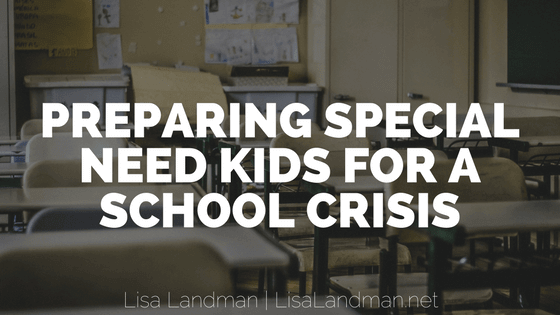Sadly, school shootings are continuing to occur. With the recent gunfire at Marjory Stoneman Douglas High School in Parkland, Florida, I started thinking about how we can keep special need kids safe during emergencies. Regardless of how the government and education system tries to prevent school shootings from happening, it’s crucial that we take a look into how we can keep our students safe, especially thinking about those with special needs.
Daily Routine
Children with special needs like routine, so when they are at school, it’s typical that they follow a similar routine every day. In Parkland, Florida, the shooting occurred after a fire alarm went off for the second time that day. Special needs children may have been warned about the first fire drill, but no one could have prepared for the second. All students are told how to act after the fire alarm goes off, but this occurrence was much different. I wonder how children with disabilities reacted once they realized it was not a typical fire drill. Would they have responded by hiding and staying calm? These answers are hard to know.
Special needs students can have difficulty responding to loud noises, unexpected drills, and the demand to be quiet because they can become quickly overwhelmed. While there are school crisis plans that help students be prepared for a school shooting or other unexpected event, however, not many take into account for special needs children.
“We don’t have a national model,” Dr. Dusty Columbia Embury, an associate professor of special education at Eastern Kentucky University, said. “And from district to district, they may have a general safety plan, but even within that safety plan it may or may not address students with disabilities.”
IELP
Dr. Embury and her colleague Dr. Laura Clarke wrote a guide for supporting students with disabilities during school crises. In their guide, they discuss one option to prepare students with disabilities for unexpected events. Dr. Embury and Clarke recommend having an Individual Emergency and Lockdown Plan© (IELP) in place for the students. The IELP helps address teaching and progress on acquiring the required skills for enduring a lockdown or emergency at school as an integral part of the student’s learning experience. The guide also recommends parents being actively involved in their child’s learning progression.
With evacuation and lockdowns drills becoming a regular occurrence in schools, special need students are often faced with disruptions of routine, unrealistic behavior expectations, accessibility problems, and other challenges. Keeping all students safe is a necessity, and both Dr. Embury and Dr. Clarke are developing a system that can prepare students with disabilities to stay safe in school crises.
Lisa Landman has a passion for helping others and has worked with special need adults throughout her career. Learn more about her professional work or check out her Twitter!


